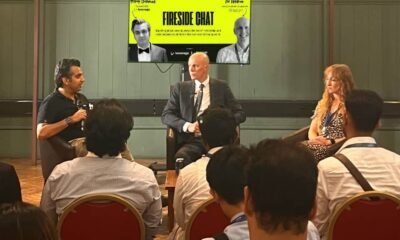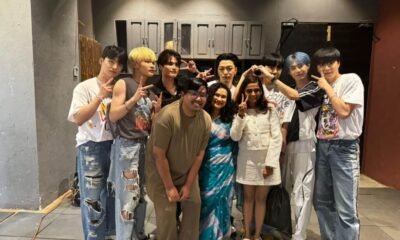Education
Manuel Barcia, University of Bath

Introduce yourself in three words or phrases.
Curious; efficient; good humoured.
What do you like most about your job?
I wake up each day knowing I’m building bridges (between continents, disciplines, perspectives, etc) and ensuring that research and education aren’t extractive but mutually enriching. Creating equitable global partnerships and seeing them develop from scratch is almost addictive.
Best work trip/Worst work trip?
Best: A trip to Ghana last year while I was still a dean at the University of Leeds. Not only did we manage to start something that I hope will blossom into a great partnership, but during our visit to Kumasi, we were invited by the KNUST’s vice-chancellor to attend the silver jubilee of their chancellor, who also happens to be the King of Asante.
For someone who is also working on a book on the First Anglo-Asante War (1823-31), getting the chance to attend this event, to join a dancing procession behind the Asante drummers as they exited the university hall, and to even shake the hand of the King, made this trip truly special.
Worst: There have been those inevitable times when a partner institution abruptly responds with bureaucracy or unequal expectations, perhaps a stalled collaboration because remote partners didn’t feel truly included. Frustrating, yes, but those are the moments that have reinforced my commitment to ethical partnership standards.
If you could learn a language instantly, which would you pick and why?
Basque. I have deep roots in the Bilbao region, and I would love to be able to go there and speak Euskera. It’s a very difficult language to learn, and sadly Duolingo doesn’t offer it yet, in spite of my multiple requests over the years.
What makes you get up in the morning?
The belief that higher education can lead global transformation if it’s inclusive and principled. Knowing that today I might start a conversation that empowers a researcher in the global south, or one that diversifies our student body, gets me out of bed. Also, I don’t underestimate the appeal of a good espresso before tackling time zones.
Champion/cheerleader which we should all follow and why?
Oh, there are many, many here I could name, but I think I am going to go with Vivienne Stern. Few people advocate for UK higher education with such clarity, diplomacy, and integrity, especially on the global stage. She understands the importance of international partnerships not as transactional arrangements, but as long-term relationships built on mutual respect.
Whether she’s in Westminster or representing us abroad, she always keeps the sector’s values front and centre – particularly around openness, inclusion, and academic freedom. Also, anyone who can keep their cool while explaining global student mobility to a Select Committee deserves applause, and possibly a medal.
Best international ed conference and why?
There are several conferences I could mention, but one that stands out is the inaugural Times Higher Education conference in Central Asia, held last autumn in Tashkent. It was the first event of its kind in a region that genuinely captivates me.
On a personal level, having grown up in Cuba, this was my first visit to the former Soviet socialist republics (I also visited Kazakhstan), and I was struck by how familiar it felt. I even got to see a welcoming Misha bear (the 1980s Olympics mascot) as soon as I hit the road there.
Professionally, it was equally memorable. Meeting so many colleagues from across the region, all passionately committed to transforming their institutions and improving opportunities for their students and peers, was a deeply affirming experience.
Book or podcast recommendation for others in the sector?
Well, as a historian perhaps my preferences here are a bit unusual. There are plenty of self-help books and podcasts now, many of them quite useful, giving advice as to how to be a good leader and warning about the potential pitfalls ahead of anyone making its way in the sector today.
To me, the book that does that better than any other is To Kill a Mockingbird, by Harper Lee. The way in which Atticus Finch, the protagonist, confronts the many challenges that come before him offers us a model of ethical leadership, integrity and courage that is second to none. A must-read for anyone wanting to become a better leader and person.
Worst conference food/beverage experience
I am not sure about food, but my worst beverage experience is coffee – any coffee – served in any conference, anywhere in the world. My personal challenge wherever I go is to find a place that serves a decent espresso, away from the so-called coffee I’ve found served at conferences everywhere so far. Definitely a sector-wide, global issue we may need to tackle as well.
Describe a project or initiative you’re currently working on that excites you.
At the University of Bath, I’m currently working with colleagues to develop a network of strategic global partners.
We’re looking for institutions that share our values and ambition; partners with whom we already have strong foundations of collaboration, and where there is clear potential to deepen that work through high-quality, high-impact research and, whenever possible, also student education. We’ve begun piecing the network together and holding initial conversations, which have been both exciting and full of promise.
Education
Cognizant’s Strategic Move into AI Education and Its Implications for Long-Term Growth

In an era where artificial intelligence (AI) is reshaping industries and redefining workforce demands, Cognizant has positioned itself as a pivotal player in the AI education landscape. The company’s recent pledge to the White House’s “Pledge to America’s Youth: Investing in AI Education” and its Synapse initiative underscore a strategic commitment to workforce transformation. By aligning with national AI goals and leveraging cutting-edge technology, Cognizant is not only addressing immediate skill gaps but also laying the groundwork for sustained growth in an AI-driven economy.
Strategic Pledge and Synapse Initiative: A National Imperative
Cognizant’s participation in the White House-led coalition marks a significant step in democratizing AI education. As part of this initiative, the company has committed to training one million individuals in advanced technologies, including AI, by 2026 through its Synapse program [1]. This pledge aligns with President Trump’s executive order on AI education and the broader mission of the White House Task Force on Artificial Intelligence Education to prepare K–12 students and underserved communities for future careers [1]. By prioritizing marginalized groups and youth, Cognizant is addressing systemic inequities in access to digital skills, a critical factor in long-term economic resilience.
The Synapse initiative is more than a corporate social responsibility effort—it is a strategic investment in the future of work. According to a joint study by Cognizant and Oxford Economics, AI could reshape up to 90% of existing jobs and contribute $1 trillion annually to the U.S. economy by 2032 [2]. By equipping individuals with AI literacy and technical skills, Cognizant is directly addressing the projected demand for a workforce capable of navigating AI-driven industries.
Partnerships and Technological Innovation: Scaling Impact
Cognizant’s collaboration with Pearson amplifies the scale and effectiveness of its AI education efforts. Together, they are developing AI-powered learning platforms that integrate generative and agentic AI, cloud-native solutions, and immersive technologies like augmented reality [1]. These tools enable personalized learning experiences, bridging the gap between education and employability. For instance, Pearson’s Credly and Faethm platforms, embedded within Synapse, provide digital credentialing and workforce analytics, ensuring learners gain verifiable skills aligned with industry needs [1].
The partnership also targets inefficiencies in career pathways, which cost the U.S. economy $1.1 trillion annually [2]. By redefining learning through AI, Cognizant and Pearson aim to streamline career transitions and reduce the friction between education and employment. This approach is particularly relevant as AI adoption accelerates; the global AI market is projected to grow from $294.16 billion in 2025 to $1,771.62 billion by 2032, with agentic AI—a subset focused on autonomous decision-making—expected to expand at a compound annual growth rate (CAGR) of 44.6% [3].
Financial Resilience and Workforce Strategy: Fueling Growth
Cognizant’s ability to execute its AI education vision is bolstered by its financial performance and hiring strategy. In Q2 2025, the company added 7,500 employees, including fresh graduates and non-traditional candidates from fields like biology and law, whom it trains on AI use cases [4]. This reflects a shift toward agile teams combining human expertise with AI agents—a model that enhances productivity and client delivery.
The company’s investment in AI infrastructure is equally robust. Cognizant manages over 2,500 active AI projects, spanning finance, procurement, and R&D, and plans to hire 15,000–20,000 freshers in 2025 [4]. These efforts are supported by strong revenue growth and expanded margins, enabling continued reinvestment in innovation [2]. By aligning its talent strategy with AI-driven demand, Cognizant is future-proofing its business while contributing to broader economic transformation.
Implications for Long-Term Growth
Cognizant’s strategic positioning in AI education offers compelling long-term value. First, its Synapse initiative taps into a market poised for exponential growth, with AI and agentic AI sectors expanding at CAGRs of 29.2% and 44.6%, respectively [3]. Second, the company’s partnerships and technological integration position it as a leader in AI-powered learning, a niche with high barriers to entry. Third, by addressing national priorities—such as AI literacy and workforce readiness—Cognizant aligns itself with policy tailwinds, ensuring sustained relevance in public and private sectors.
For investors, Cognizant represents a dual opportunity: capitalizing on the AI education boom while supporting a workforce transformation critical to global economic competitiveness. As AI reshapes industries, companies that invest in human-AI collaboration, like Cognizant, are likely to outperform peers in both innovation and profitability.
Source:
[1] Pearson and Cognizant Announce Global Strategic Partnership to Enhance Learning, Support Early Career Development and Build Workforce Readiness [https://www.prnewswire.com/news-releases/pearson-and-cognizant-announce-global-strategic-partnership-to-enhance-learning-support-early-career-development-and-build-workforce-readiness-302543612.html][2] Cognizant Joins AI Education Taskforce meeting at the White House to advance AI literacy nationwide [https://www.gurufocus.com/news/3094778/cognizant-joins-ai-education-taskforce-meeting-at-the-white-house-to-advance-ai-literacy-nationwide-ctsh-stock-news][3] Artificial Intelligence [AI] Market Size, Growth & Trends by…, [https://www.fortunebusinessinsights.com/industry-reports/artificial-intelligence-market-100114][4] Cognizant adds 7500 in Q2, lifts outlook on robust deal wins [https://timesofindia.indiatimes.com/city/bengaluru/cognizant-adds-7500-in-q2-lifts-outlook-on-robust-deal-wins/articleshow/123046893.cms]
Education
Cyber Innovation Center attends AI Education Taskforce Roundtable at the White House – Bossier Press-Tribune

1
Kevin Nolten, president of the Cyber Innovation Center (CIC), attended a special White House roundtable
hosted by the First Lady of the United States (FLOTUS) focused on Artificial Intelligence (AI) education
Thursday.
Nolten joined senior leaders from executive departments and agencies, including the Secretaries of
Agriculture, Education, Energy, and Labor. Other attendees included the Director of the Office of Science and
Technology Policy, the Director of the National Science Foundation (NSF), the Assistant to the President for
Policy, the Assistant to the President for Domestic Policy, and the Special Advisor for AI & Crypto.
AI is growing in its use for threat detection and prediction, incident response, and more. However, it also
poses risks as it’s leveraged to create automated attacks, disinformation, and privacy concerns among
others. The AI education taskforce aims to equip students with the knowledge to use AI responsibly and
effectively, while also addressing these risks.
The CIC is committed to supporting the FLOTUS’ priorities of infrastructure, national security, and talent
through its workforce and academic initiative, CYBER.ORG. By leveraging more than a decade of experience
providing cybersecurity education and workforce development resources to K–12 educators, CIC and
CYBER.ORG are advancing the goals of the President’s Executive Order on AI.
“The CIC offers age-appropriate, ethical, and educationally relevant curricula that lays an early foundation
and helps build the skills needed to pursue continued education in emerging technologies like AI,” said
Nolten. “By integrating AI into classrooms in a safe and intentional way, we ensure students understand its
potential and its risks. This empowers them to use the technology responsibly, fuels curiosity, and
strengthens digital literacy to support the nation’s talent pipeline.”
As the nation faces an urgent need for a highly skilled cybersecurity and AI workforce, federal agencies and
their partners must adopt innovative strategies to ensure access to top-tier professionals.
To help meet this challenge, CIC and CYBER.ORG have reached more than 45,000 K–12 educators and 5.6
million students across all 50 states and four U.S. territories. Beyond K–12, CIC collaborates with higher
education and industry partners to strengthen the national talent pipeline.
Over the next 12 months, CIC aims to train an additional 6,500 educators, reach 1 million students, and host
250 professional development events nationwide.
The organization’s mission is to prepare the next generation to navigate and secure an increasingly AI-driven
digital world by equipping learners with the skills needed to harness AI responsibly.
“The result of our work is a generation of students whose cybersecurity knowledge is guiding them toward
careers in cyber and other emerging technology fields,” Nolten said. “Because AI is both a powerful defense
tool and a potential weapon, it is an essential component of modern cybersecurity education, and we are
proud to support this taskforce.”
Education
AI and Analog Education

Classes started yesterday. I did a goofy “dad joke” sort of thing. I told the undergrads we were going to incorporate a technology which will provide for a direct brain to output interface allowing them to produce completely original content. It was going to really let them express their individuality. It gives them direct access to a highly complex and adaptable processing unit capable of highly abstract reasoning. This technology was completely safe with regard to their personal information and that there would be no need for a VPN. I assured them that they wouldn’t even need an internet connection. At that point I said “Allow me to introduce you to The Pencil” and I raised one high in the air for all to see.
It was the first day, we talk about AI. Thing is, they know cutting and pasting from ChatGPT is cheating and lying. They might make their choice and take their chances. Ive successfully used “trojan horses” and other tactics to trick the AI in order to expose students. But maybe the cheating works and maybe it doesn’t and they fail. But most students aren’t cheating, at least not intentionally. They do think it is wrong. They understand they should not do this.
They don’t understand how the problem is what they think they are doing “to save time”.
At the beginning I tell them about the MIT study, which I do not think has been officially peer reviewed yet and the sample size is a bit small for my tastes. Using AI can cause them to lose cognitive abilities. If they use AI, they need to go “Brain>AI>Brain” and not simply “AI>Brain”. We discussed how they needed to do the course reading first and then try to answer the assignment on their own. Using the AI AFTER doing that might be helpful. They can ask if their idea is a good response. They can read what the AI has said, which will likely reinforce what they were supposed to have read already and possibly phrase it in way that makes things clearer for them. They use the AI ideas to finalize their assignment and hand it in. The AI has now been like a kind of tutor, a helpful assistant. Citations from the assigned text with proper bibliographic references still required. (AI gets that one wrong A LOT)
But the danger lies in going to the AI first without trying to come up with the answer on their own. Using the AI to “brainstorm”. They ask the AI for an example or maybe even a few examples. They read what the AI has to say and not really the assigned text (maybe they skimmed it for 5 minutes). They construct their answer from there, not even realizing how much they are subconsciously copying the words from the AI. In this process, they are offloading or outsourcing the cognitive act of thinking of the example. They get no practice in reasoning. That ability is not developed.
This is the key: the students who rely on AI are not developing their skills in reasoning and logic nor are the working much on their memory or the skill to focus on a long text and make sense of it. They don’t well retain what they read. They are not learning.
It’s the beginning of the semester. We had to talk about ultra processed writing. Its like ultra processed food, but in essay form. It is how they might use a service like Grammarly or Co-Pilot to alter their writing. These programs offer word choice and check sentence logic and reform one’s ideas. A student this summer told me she used it to check her “tone and flow”. Another said she used it to translate from her first language into English. This creates the most sterile and bland writing. I tell them that these services turn their ideas and phrasing into the most predictable ways that it can be. Their own voice disappears. I emphasize how it removes their individuality and that they are simply not expressing themselves (“You are not expressing You”). Everything becomes the same. And that they are not giving me writing that they have done if the AI alters it into something else.
It’s the same issue. They aren’t practicing their skills in logic and reasoning. They aren’t practicing expressing themselves in writing, which often has a direct connection to how they can express themselves in speech. I have to tell them “The brain is a muscle, use it or lose it”. And the solution is to use the internet/computer less and force everyone to rely on their brains more.
I know Im not alone. I think there is a silent revolution in education going on this fall. More in-class work. Less computer/internet based. More actual writing by hand. The reintroduction of the pencil.
I know AI can be a useful tool. I know Ai can process information and discover patterns that we cannot see. Ai can be a great resource or even an assistant for a professional in their field. But a learning process is very much about the student learning to do it without the assistant. The student is supposed to be “the assistant”. “The assistant” doesn’t get an assistant, because the professional-assistant or teacher-student relationships are what transform the assistant/student into the professional. It’s just a variation of the master-apprentice relationship so ingrained in human-kind which has stood the test of time for millennia.
Mostly it is people who know nothing about education that promote AI in education. The public discussions by the tech folks and GOPers and the former soft-core porn models are motivated by money. The dominant ideology is that of AI being a necessity. Maybe some of this is legitimate educators committed to teaching all things STEM and technology. But mostly it’s the folks who make money off of Ai telling people how great AI is and how it is going to revolutionize education.
But they cant stop me from handing out pencils. Blue books too.
-

 Business6 days ago
Business6 days agoThe Guardian view on Trump and the Fed: independence is no substitute for accountability | Editorial
-
Tools & Platforms3 weeks ago
Building Trust in Military AI Starts with Opening the Black Box – War on the Rocks
-

 Ethics & Policy1 month ago
Ethics & Policy1 month agoSDAIA Supports Saudi Arabia’s Leadership in Shaping Global AI Ethics, Policy, and Research – وكالة الأنباء السعودية
-

 Events & Conferences4 months ago
Events & Conferences4 months agoJourney to 1000 models: Scaling Instagram’s recommendation system
-

 Jobs & Careers2 months ago
Jobs & Careers2 months agoMumbai-based Perplexity Alternative Has 60k+ Users Without Funding
-

 Education2 months ago
Education2 months agoVEX Robotics launches AI-powered classroom robotics system
-

 Funding & Business2 months ago
Funding & Business2 months agoKayak and Expedia race to build AI travel agents that turn social posts into itineraries
-

 Podcasts & Talks2 months ago
Podcasts & Talks2 months agoHappy 4th of July! 🎆 Made with Veo 3 in Gemini
-

 Podcasts & Talks2 months ago
Podcasts & Talks2 months agoOpenAI 🤝 @teamganassi
-

 Education2 months ago
Education2 months agoMacron says UK and France have duty to tackle illegal migration ‘with humanity, solidarity and firmness’ – UK politics live | Politics



















